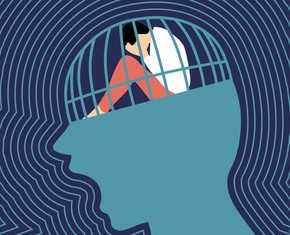The views expressed in our content reflect individual perspectives and do not represent the authoritative views of the Baha'i Faith.
In my spare moments I voluntarily serve on the board of directors of my local homelessness charity. Last week a client died from an overdose in our shelter, and that death has caused great grief for our staff.
I can’t talk about the details or the client’s name. I have no idea whether the overdose was intentional or not – we’ll probably never know. But I do understand, in a general sense, and from the many, many similar cases I’ve seen after four decades of working with unhoused poor people, that the United States is now facing a full-blown drug overdose epidemic.
Meth and the synthetic opioid fentanyl, the two chief drivers of this epidemic, are cheap, easy to get, and very, very deadly.
RELATED: Opioids and the Loss of a Child: Heartened through Heartbreak
This isn’t just a local phenomenon where I live, either. Drug overdose deaths have risen exponentially in the United States over the past two decades. Take a look at this chart from the National Institutes of Health, and you’ll get a real sense of how terrible the toll has become:
Public health experts call these overdoses, along with fatalities from alcoholic liver disease and other kinds of suicide, “deaths of despair” – and point out that the rapidly-increasing sheer numbers of those kinds of deaths have actually lowered the overall life expectancy of the entire country.
What causes these deaths of despair? David Introcaso, writing in the medical journal STAT, described the causes this way:
Insecurity, deprivation, the loss of possibilities, the lack of belonging, hopelessness, and social maladjustment lead to negative emotions including loneliness, unhappiness, worry, and stress that in turn lead individuals to, in part, experience more pain and pain sensitivity both physical and psychological.
Sound familiar? Lately, many people have dealt with at least some of these feelings. After all, things are tough these days. The pandemic, economic distress, joblessness and homelessness have all added to the pain of the present.
So what’s the solution?
At the shelter I help run, we use a temporary solution called naloxone. Commonly known by its commercial name Narcan, it reverses opioid overdoses – if administered in time – and often gives those dying of despair another chance at life. Like many non-profit agencies and paramedics and clinics and hospitals, we’re using lots of naloxone these days.
Even transit system workers all over the United States carry naloxone now, to try and stop overdose deaths among train, bus, and subway riders.
But naloxone is only a transitory solution. It can save lives in the immediate short term, but does nothing to solve the inner pain and underlying despair, or change the conditions that produced them.
No medication could do that. Only a spiritual solution can permanently end despair and the unnecessary early deaths it produces.
The Baha’i teachings address those solutions directly, providing a permanent prescription for relief from despair and pain. Abdu’l-Baha, in a speech he gave in Paris in 1913, said:
In this world we are influenced by two sentiments, Joy and Pain.
Joy gives us wings! In times of joy our strength is more vital, our intellect keener, and our understanding less clouded. We seem better able to cope with the world and to find our sphere of usefulness. But when sadness visits us we become weak, our strength leaves us, our comprehension is dim and our intelligence veiled. The actualities of life seem to elude our grasp, the eyes of our spirits fail to discover the sacred mysteries, and we become even as dead beings.
There is no human being untouched by these two influences; but all the sorrow and the grief that exist come from the world of matter – the spiritual world bestows only the joy!
If we suffer it is the outcome of material things, and all the trials and troubles come from this world of illusion.
For instance, a merchant may lose his trade and depression ensues. A workman is dismissed and starvation stares him in the face. A farmer has a bad harvest, anxiety fills his mind. A man builds a house which is burnt to the ground and he is straightway homeless, ruined, and in despair.
All these examples are to show you that the trials which beset our every step, all our sorrow, pain, shame and grief, are born in the world of matter; whereas the spiritual Kingdom never causes sadness. A man living with his thoughts in this Kingdom knows perpetual joy. The ills all flesh is heir to do not pass him by, but they only touch the surface of his life, the depths are calm and serene.
… the trials which beset our every step, all our sorrow, pain, shame and grief, are born in the world of matter; whereas the spiritual Kingdom never causes sadness. A man living with his thoughts in this Kingdom knows perpetual joy. The ills all flesh is heir to do not pass him by, but they only touch the surface of his life, the depths are calm and serene.
Today, humanity is bowed down with trouble, sorrow and grief, no one escapes; the world is wet with tears; but, thank God, the remedy is at our doors. Let us turn our hearts away from the world of matter and live in the spiritual world! It alone can give us freedom!
Turning our hearts and our thoughts toward the spiritual world – the eternal reality, as opposed to this fleeting material existence, which invariably disappoints us – gives us a respite from our temporal troubles. Focusing on that spiritual world helps us see the long view, far into the future, instead of the short-term, day-to-day one, which will perpetually challenge us with tests, trials, and tribulations.
Of course, like all things, developing this kind of joyous spiritual focus takes work. It doesn’t happen in a day or a week or a month. It requires an ongoing, systematic spiritual discipline – an agreement with yourself to commit to a daily practice of meditation, reflection, and prayer.
RELATED: How Meditation Jump-Started My Journey Out of Darkness
That regular spiritual practice gives everyone who engages in it the great gift of detachment. With it, your own immediate concerns recede in importance, and the concerns of others become more significant. Spirituality causes a sense of selflessness to arise. A calm comes over your consciousness. Newly engaged in the lives of others, each person with a consistent spiritual discipline watches the world with a wider lens, which minimizes individual difficulties and maximizes awareness, allowing our hearts to obtain the beauty and love and unity our souls truly need for spiritual and psychological health.
Once you’ve done that work overtime it definitely pays off, reducing existential pain and despair. Multiple scientific studies have shown that this kind of spiritual discipline, when employed regularly, helps lower blood pressure, alleviate stress and anxiety, and create more emotional resiliency. Also, those who enter into and honor a commitment to a sustained spiritual discipline gradually become less concerned with their troubles and less agitated by the changes and chances of the material world. Their stress diminishes. They enter into a spiritual state that confers peace rather than pain, that centers on the happiness of others rather than their own, and that allows individual despair to be replaced by collective joy.
In Mahmud’s Diary, Abdu’l-Baha described that spiritual state with this beautiful metaphor:
Man must become evanescent and self-denying. Then all the difficulties and hardships of the world will not touch him. He will become like unto a sea, although on its surface the tempest is raging and the mountainous waves rising, in its depth there is complete calmness.
If you haven’t already developed that complete calmness, you can start today. Simply sit yourself down in a quiet place, give yourself some time, and allow your mind to meditatively reflect. Pray, if you like, and ask the Creator for the answers to your questions. Or pose those questions to yourself: how can I transcend the petty material concerns I encounter every day? How do I connect with a deeper and more profound reality? How can I sustain the feelings of peace and joy I need?
Don’t just do this once. Make it a consistent practice. Find time for it every day. Soon, if you let it become a regular part of your life, you’ll begin to see it as essential to your well-being. You’ll discover depths in yourself that you weren’t aware of before. Ultimately, your despair will dissipate, and your happiness will increase.
You May Also Like
Comments

















Next thing I know a friend’s friend, a young girl in her twenties, had passed from what was rumoured to be an overdose 😔